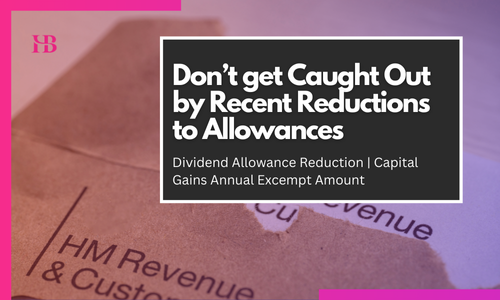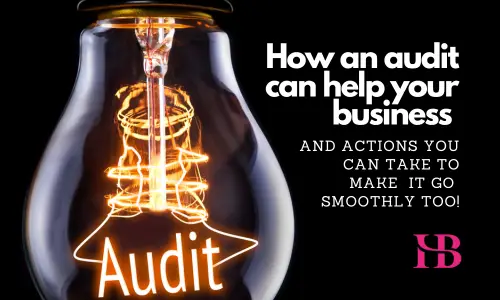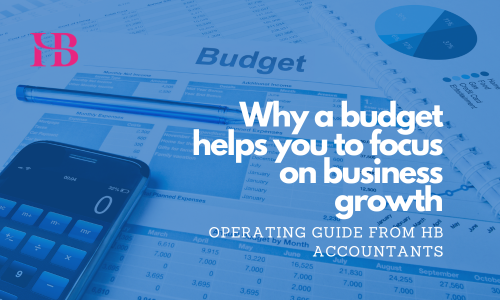Significant tax changes are coming for 2024-25, with reductions to both the Dividend Allowance and Capital Gains Tax (CGT) annual exempt amount. These changes could impact how you manage your investments and finances, making it important to stay informed and plan ahead. Here’s what you need to know and how to prepare.

What is the Dividend Allowance?
The Dividend Allowance is the total amount you can receive in dividends before you must start paying tax on them. The allowance for the 2023/24 tax year (period from 6th April 2023 – 5th April 2024) was £1,000 and on 6th April 2024, the allowance was reduced further to only £500 for the 2024/25 tax year.
Dividends that are issued through ISAs will remain tax-free.
What to do if you have dividend earnings of over £500 during the 24/25 tax year
If, during the 2024/25 tax year (period from 6th April 2024 – 5th April 2025) you receive taxable dividends of under £10,000 and over the dividend allowance you, will need to notify HMRC.
- Contact HMRC
- Ask HMRC to change your tax code (this means the tax for your dividend income, over the allowance, will be taken from your wages or pension)
And if you receive taxable dividend earnings of over £10,000, you will need to complete a self-assessment tax return.
What to do if you Exceed the Dividend Allowance?
To avoid penalties for failure to notify, you must ensure that you notify HMRC that you have dividend earnings that have exceed the annual allowance.
Keeping your Accountant or Tax Advisor informed: Make sure to review your records with regards to dividend earnings and let your accountant or tax professional informed. HB Accountants can assist in notifying HMRC on your behalf.
What is the Capital Gains Tax Annual Exempt Amount
For the 2023/24 tax year, the annual exempt amount was reduced to £6,000 for individuals and £3,000 for most trustees. This has been reduced further for the 2024/25 tax year. For the 2024/25 tax year the capital gains annual exempt amount is £3,000 for individuals and £1,500 for most trustees.
Capital gains on assets held within a tax efficient wrapper, such as an ISA, will be unaffected.
Individuals and Trustees who have gains that have exceeded the annual exempt amount will need to notify HMRC – the way this is done depends on the asset that has been sold:
Residential property:
- You must report and pay any Capital Gains Tax Due on Residential Property via a Capital Gains Tax Return within:
- 60 days if selling the property if the completion date was on or after 27th October 2021
- 30 days of selling the property if the completion date was between 6th April 2020 and 26th October 2021
- If you are already registered for self-assessment, you also need to include the details of the sale in your Self-Assessment tax return
Other assets including Commerical Property:
- on a self-assessment tax return
- by using the ‘real time’ Capital Gains Tax service (only available if you are UK tax resident and an individual) – If you’re already registered for Self-Assessment, you’ll also need to include details of the sale in your Self-Assessment tax return.
Please get in contact if you require assistance with capital gains that exceed the annual exempt amount.
Increase in Interest Rates on Savings:
Since August 2021, the UK has witnessed a gradual increase in interest rates, meaning many people are now earning more interest income on their savings. There are a number of tax allowances in relation to interest:
- Your personal allowance – this is currently £12,570 and looks to be frozen for the foreseeable future – you can use your Personal Allowance to earn interest tax-free if you have not used it up on your wages, pension or other income
- Starting rate for savings – You may also get up to £5,000 of interest and not have to pay tax on it. This is your starting rate for savings: You’re not eligible for the starting rate for savings if your other income is £17,570 or more.
- If your other income is less than £17,750, your starting rate for savings is a maximum of £5,000. Every £1 of other income above your Personal Allowance (£12,570) reduces your starting rate for savings by £1.
- Personal Savings Allowance – You may also get up to £1,000 of interest and not have to pay tax on it, depending on which Income Tax band you’re in. This is your Personal Savings Allowance – the personal savings allowance is as follows:
| Income Tax Band | Personal Savings Allowance |
| Basic Rate (20%) | £1,000 |
| Higher Rate (40%) | £500 |
| Additional Rate (45%) | £0 |
You pay tax on any interest over your allowance at your usual rate of Income Tax.
If you’re employed or get a pension, HMRC will change your tax code so you pay the tax automatically. To decide your tax code, HMRC will estimate how much interest you’ll get in the current year by looking at how much you received during the previous year.
If you complete a Self-Assessment tax return, report any interest earned on savings there.
You need to register for Self-Assessment if your income from savings and investments is over £10,000
In the coming years, HMRC is likely to increase efforts to identify individuals who haven’t declared dividends exceeding the reduced allowance or gains surpassing the annual exempt amount for Capital Gains Tax (CGT)
Penalties and Interest: For those found to have underpaid tax, HMRC is likely to impose backdated taxes along with penalties and interest.
Please get in contact if you need any assistance with reviewing your investment/savings/property income.
The information contained above is for general guidance purposes only. Whilst every effort has been made to ensure the contents are accurate, please note that each individual has different circumstances and it is essential that you seek appropriate professional advice before you act on any of the information contained herein. HB Accountants can accept no liability for any error
Read Our Latest Blogs Below
- HMRC Advisory Fuel Rates (AFRs) from 1st June 2025
 HMRC has published the latest Advisory Fuel Rates (AFRs) which apply from 1 June 2025. AFRs are the official rates used when reimbursing employees for business mileage in company cars. They’re reviewed every quarter (February, May, August and November) and adjusted in line with fuel prices.
HMRC has published the latest Advisory Fuel Rates (AFRs) which apply from 1 June 2025. AFRs are the official rates used when reimbursing employees for business mileage in company cars. They’re reviewed every quarter (February, May, August and November) and adjusted in line with fuel prices. - How an audit can help your business (and actions you can take to make it go smoothly too!)
 An audit may be a legal requirement for your business but a well managed audit can also boost your business growth and ensure that it is operating in the best way possible.
An audit may be a legal requirement for your business but a well managed audit can also boost your business growth and ensure that it is operating in the best way possible. - Why a budget helps you to focus on business growth
 Are you looking for clarity over the future direction of your business? Do you want to know the actions you should take in order to grow your business? Then consider taking time to create a budget for your business.
Are you looking for clarity over the future direction of your business? Do you want to know the actions you should take in order to grow your business? Then consider taking time to create a budget for your business. - How a SME Owner Can Create More Time
 SME owners and managers – are you part of the one in five small and medium-size enterprise managers that work on average an additional 3 hours a day on a regular basis? Or one of the 33% that claim that there just aren’t enough minutes in a day to get everything completed? (The Independent study … Continue reading
SME owners and managers – are you part of the one in five small and medium-size enterprise managers that work on average an additional 3 hours a day on a regular basis? Or one of the 33% that claim that there just aren’t enough minutes in a day to get everything completed? (The Independent study … Continue reading - A New Academic Year for our Student in Zambia
 As the new academic year unfolds in Zambia, we are delighted to share an update about our sponsored student, Getrude. Currently in her second year at Chalimbana University, Gertrude is studying Business Administration in Accounting and Finance.
As the new academic year unfolds in Zambia, we are delighted to share an update about our sponsored student, Getrude. Currently in her second year at Chalimbana University, Gertrude is studying Business Administration in Accounting and Finance.

